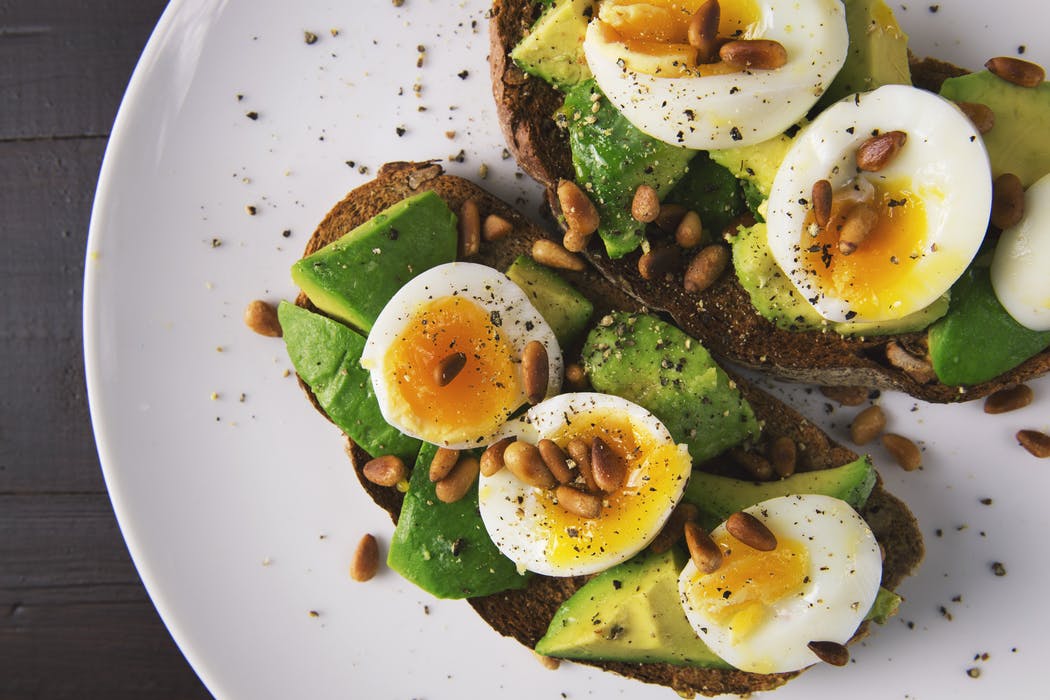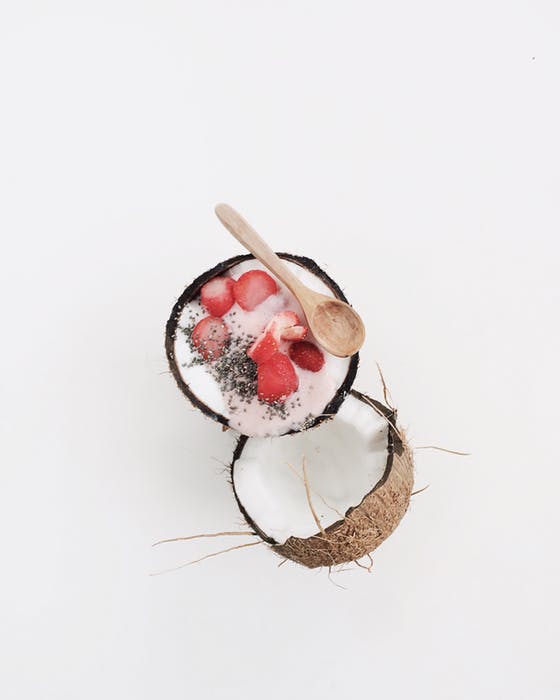If you follow me on social media and read my blogs, you know I’m a huge fan of healthy fats.
But maybe you’re wondering WHY? Won’t all this fat make me fat? Don’t I have to be careful with oils, coconut and avocado?
I’ll break it down simply so you understand a bit more of the pros/cons, the good and bad fats, and hopefully I’ll remove your fear of fat!
WHY I LOVE HEALTHY FATS
Fat is your best long-lasting FUEL. Healthy fats can help with weight loss, reduce the risk of heart disease and decrease inflammation (as long as you’re eating the right ones!). They’re also necessary for absorption of many nutrients (you’ve probably heard of fat-soluble vitamins which means we need fat in our meals to absorb these vitamins), and they’re essential for your brain, balanced hormones, healthy skin/hair, reducing stress, and so much more.
If you eat more healthy fats and cut out unhealthy carbs, you will burn more fat, have less cravings, boost your brain, age better and have less inflammation!
Eating some healthy fats at every meal is ideal, as long as you’re focusing on the healthier fats (and of course, make sure you’re not ruining your good healthy fats by cooking them at a temperature above its smoke point, which can oxidize the fat and make it not-so-healthy). READ MORE HERE to learn more on some of the best/worst oils for cooking.
WHICH FATS ARE THE “HEALTHY FATS”?
For many years, society/media told us all fat was BAD, and the key to healthy weight loss was removing fat from everything. That created a surge of processed low-fat foods, which we later discovered are SO BAD for our health. Following this low-fat fad, we deprived our bodies of the bad AND THE GOOD fats, and instead filled up on harmful ingredients that were being placed into these low-fat products – including sugar and chemicals. (Yes most “low-fat” products use sugar to replace the fat).
The key lies in DIFFERENTIATING between the unhealthy and the healthy fats; eliminating the unhealthy ones from our diet, and consuming the good ones, consistently, in moderation.
NOTE: Everyone is different and some people need more healthy fats than others, and some people benefit more from some specific fats sources than other sources. Ex. organic ghee is amazing for some people, while others do best limiting ghee and butter, and consuming more olive oil. But for this blog, I have to generalize a bit (but feel free to contact me if you’d like to go deeper into what’s best for YOU).
THE WORST: Trans Fats.
These fats are the result of a “hydrogenation” process that is used to turn oils into solids and to prevent them from becoming rancid. Trans fats have shown to create inflammation and raise LDL cholesterol (while lowering good HDL), plus are linked to heart disease, stroke, diabetes, and other chronic conditions. They can also contribute to insulin resistance which increases the risk of developing type 2 diabetes.
Sources of trans fats include most margarines, creamers, and basically anything with “hydrogenated” or “partially-hydrogenated” oils/fats, which are very often found in packaged goods such as packaged baked goods (cookies, brownies etc), microwave popcorn, fried foods, packaged refrigerated premade doughs (ex pizza or cookie doughs), packaged sauces/dressings, and more.
To avoid Trans Fats it’s key to limit processed foods in general, and ALWAYS read ingredients (not just label of calories and fat, but actual listed ingredients) of any packaged product.
THE GOOD (in moderation): Saturated Fats.
Despite controversy on saturated fats, they are a necessity for healthy immune functions, hormonal health and brain health.
Healthy sources of saturated fat include: eggs (preferably pasture raised and organic), grass-fed organic ghee (clarified butter), grass-fed bone broth, coconut oil and everything coconut.
Other sources include: milk (especially whole milk) and other dairy foods like cheese, and all red meat.
Again, it’s key to distinguish among saturated fats and opt for organic options and those that suit your body type the best. And I suggest BALANCING out your fat sources so you’re not overdoing it. For example, if you eat a lot of coconut and coconut oil (like I do) then reduce other sources of saturated fat like milk and cheese and go easy on the red meat. And of course, make sure to include lots of healthy unsaturated omega-3 rich fats, too.
Doesn’t Saturated Fat lead to heart disease? Most studies show that while a diet rich in saturated fats will likely drive up total cholesterol, this is NOT a driver of heart disease (not on its own).
Plus, eating more healthy cholesterol rich foods (real food sources and avoiding processed foods) can raise your HDL (“good cholesterol”) while lowering triglycerides, so actually the net effect on your cholesterol is positive!
There is lots of controversy on this topic, but all the highly-researched and educated doctors that I follow who are at the forefront of nutrition (ex. Dr Mark Hyman, Dr. Will Cole, Dr. Frank Lipman) agree that saturated fat doesn’t cause heart disease, especially if you’re sticking to a healthy diet filled with fiber, greens, veggies, water and some exercise! There are many other factors much worse for your heart health. So all my research and personal experience have shown that the benefits of (some) saturated fats outweighs the negatives. But again, I believe in balance and moderation.
THE BEST: Monounsaturated and omega-3-rich Polyunsaturated fats.
Monounsaturated oils have shown to contribute to heart health and reduce risk of stroke, improve insulin resistance and reduce belly fat.
Healthy Polyunsaturated Omega-3 fatty acids may also help prevent and even treat heart disease and stroke, in addition to reducing blood pressure, raising HDL, and lowering triglycerides.
But just like the saturated fats, there are good and bad choices within the unsaturated fats! You want to focus on those with higher Omega-3 fatty acids than Omega-6, and LIMIT (or even AVOID) the highly processed ones like canola, soybean, safflower and vegetable oils.
Good sources of Monounsaturated fats include: olive oil, avocado oil, and most nut and seed oils (ex. sesame seed oil and walnut and macadamia nut oils).
Good sources of omega Polyunsaturated include: nuts (especially walnuts), seeds (especially flax, hemp and chia seeds), fish (especially fatty fish, and always opting for wild-caught /not farm-raised when possible).
WHAT DO I EAT? WHAT HEALTHY FATS DO I SUGGEST?
I believe that switching up and combining some of “the good” with “the best” and always avoiding “the worst” is key to a healthy diet. Here is what I do and (generally) recommend:
EAT lots of:
extra virgin olive oil
avocados (and avocado oil is great for cooking)
nuts and nut butters
seeds and seed butters
fatty fish (aim for wild-caught, and generally smaller fish that are lower in mercury)
grass-fed organic ghee (clarified butter)
coconut oil (and coconut meat and coconut butter)
pasture-raised eggs
bone broth (from grass-fed beef bones or organic chicken bones)
LIMIT: dairy products and meat
AVOID: all products with trans fats
*remember each person is different and if you have a specific health concern, it’s always good to check with your doctor(s) and other health practitioners.
Love and HEALTHY fats,
Mariana




